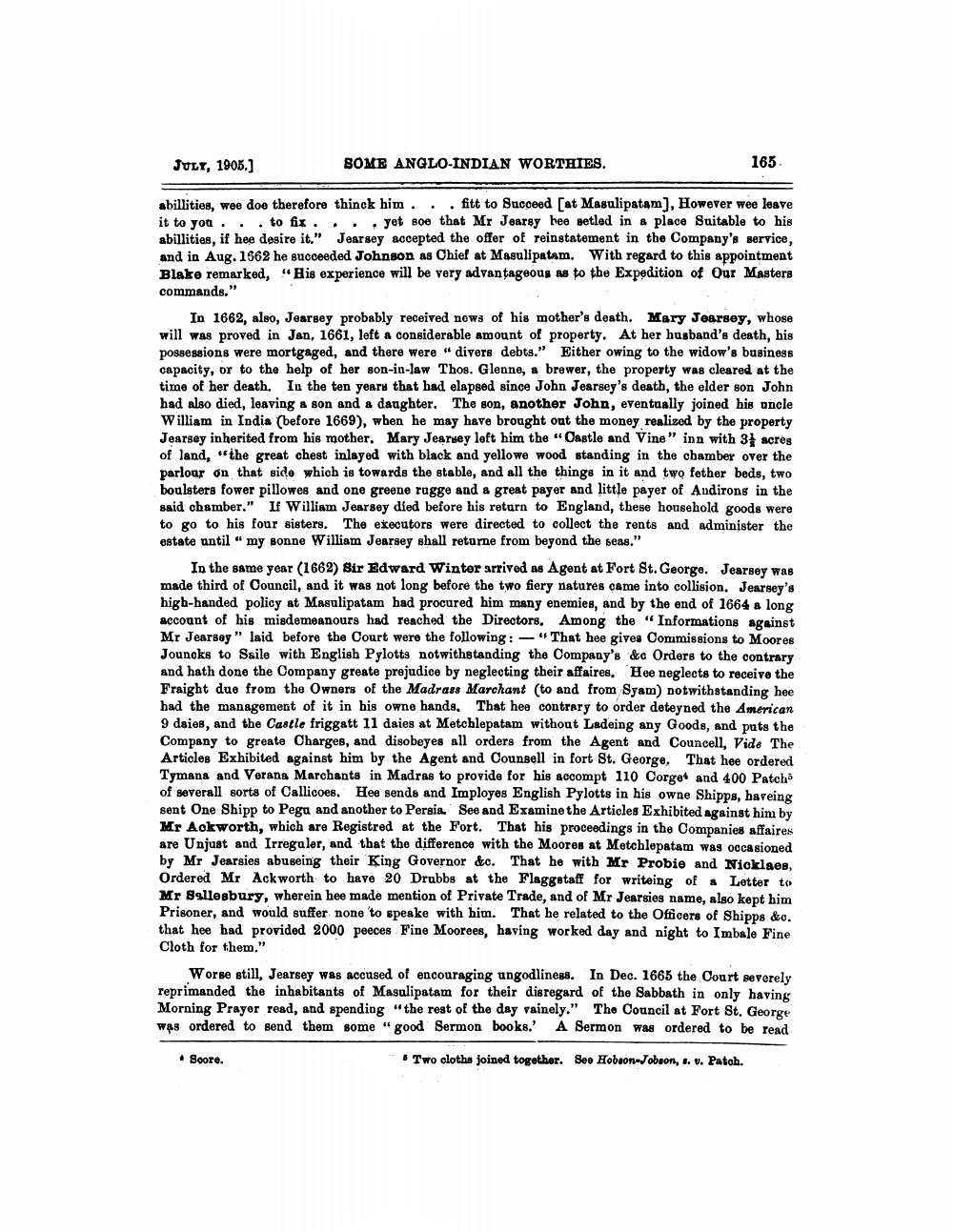________________
JULY, 1905.)
BOME ANGLO-INDIAN WORTHIES.
165
abillities, wee doe therefore thinck him ... fitt to Succeed [at Masulipatam), However wee leave it to you ... to fix. ... yet soe that Mr Jearsy hee eetled in a place Suitable to his abillities, if hee desire it." Jearsey accepted the offer of reinstatement in the Company's service, and in Aug. 1562 he succeeded Johnson as Chief at Masulipatam. With regard to this appointment Blake remarked, "His experience will be very advantageous as to the Expedition of Our Masters commands."
In 1662, also, Jearsey probably received news of his mother's death. Mary Jearsey, whose will was proved in Jan, 1661, left a considerable amount of property. At her husband's death, his possessions were mortgaged, and there were " divers debts." Either owing to the widow's business capacity, or to the help of her son-in-law Thos. Glenne, a brewer, the property was cleared at the time of her death. In the ten years that had elapsed since John Jearsey's death, the elder son John had also died, leaving & son and a daughter. The son, another John, eventually joined his uncle William in India (before 1669), when he may have brought out the money realized by the property Jearsey inherited from his mother. Mary Jearney left him the “Castle and Vine" inn with 31 acreg of land, "the great chest inlayed with black and yellowe wood standing in the chamber over the parlour on that side which is towards the stable, and all the things in it and two fether beds, two boalsters fower pillowes and one greene rugge and a great payer and little payer of Andirons in the said chamber." If William Jearsey died before his return to England, these household goods were to go to his four sisters. The executors were directed to collect the rents and administer the estate until "my sonne William Jearsey shall returne from beyond the seas."
In the same year (1662) Sir Edward Winter arrived as Agent at Fort St. George. Jearsey was made third of Council, and it was not long before the two fiery natures came into collision. Jearsey's high-handed policy at Masulipatam had procured him many enemies, and by the end of 1664 a long account of his misdemeanours had reached the Directors. Among the "Informations against Mr Jearsey" laid before the Court were the following: -"That hee gives Commissions to Moores Jouncks to Saile with English Pylotts notwithstanding the Company's &c Orders to the contrary and hath done the Company greate prejudice by neglecting their affaires. Hee neglects to receive the Fraight due from the Owners of the Madrass Marchant (to and from Syam) notwithstanding hee had the management of it in his owne hands. That hee contrary to order deteyned the American 9 daies, and the Castle friggatt 11 daies at Metchlepatam without Ladeing any Goods, and puts the Company to greate Charges, and disobeyes all orders from the Agent and Councell, Vide The Articles Exhibited against him by the Agent and Counsell in fort St. George, That hee ordered Tymana and Verana Marchants in Madras to provide for his accompt 110 Corget and 400 Patch of severall sorts of Callicoes. Hee sends and Imployes English Pylotts in his owne Shipps, haveing sent One Shipp to Pegu and another to Persia. See and Examine the Articles Exhibited against him by Mr Aokworth, which are Registred at the Fort. That his proceedings in the Companies affaires are Unjust and Irreguler, and that the difference with the Moores at Metchlepatam was occasioned by Mr Jearsies abuseing their King Governor &c. That he with Mr Probie and Nicklaes, Ordered Mr Ackworth to have 20 Drubbs at the Flaggstaff for writeing of a Letter to Mr Sallesbury, wherein hee made mention of Private Trade, and of Mr Jearsies name, also kept him Prisoner, and would suffer none 'to speake with him. That he related to the Officers of Shipps &c. that hee had provided 2000 peeces Fine Moorees, having worked day and night to Imbale Fine Cloth for them."
Worse still, Jearsey was accused of encouraging ungodliness. In Dec. 1665 the Court severely reprimanded the inhabitants of Masulipatam for their disregard of the Sabbath in only having Morning Prayor read, and spending "the rest of the day vainely." The Council at Fort St. George was ordered to send them some "good Sermon books.' A Sermon was ordered to be read
• Soore.
Two clotha joined together. Seo Hobson-Jobson, I. v. Patoh.




